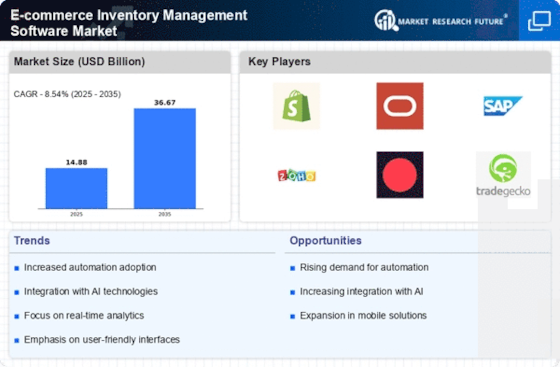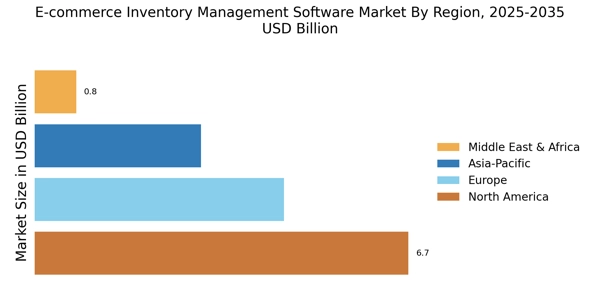Growth of Omnichannel Retailing
The growth of omnichannel retailing is significantly influencing the E-commerce Inventory Management Software Market. Retailers are increasingly adopting a multichannel approach, integrating online and offline sales channels to provide a seamless customer experience. This shift necessitates sophisticated inventory management solutions that can synchronize stock levels across various platforms. It is projected that by 2026, omnichannel sales will account for over 50% of total retail sales. Consequently, the demand for inventory management software that can support this integration is expected to rise, as businesses seek to optimize their operations and enhance customer engagement.
Rising Demand for E-commerce Solutions
The increasing demand for e-commerce solutions is a primary driver of the E-commerce Inventory Management Software Market. As more businesses transition to online platforms, the need for efficient inventory management becomes paramount. In 2025, it is estimated that e-commerce sales will reach approximately 6 trillion USD, highlighting the necessity for robust inventory systems. Companies are seeking software that can streamline operations, reduce costs, and enhance customer satisfaction. This trend indicates a growing market for inventory management solutions that can integrate seamlessly with various e-commerce platforms, thereby facilitating smoother transactions and better stock control.
Increasing Focus on Customer Experience
An increasing focus on customer experience is shaping the E-commerce Inventory Management Software Market. Businesses are recognizing that efficient inventory management directly impacts customer satisfaction. Delays in order fulfillment or stockouts can lead to lost sales and diminished brand loyalty. As e-commerce continues to thrive, companies are investing in inventory management solutions that enhance order accuracy and speed. Research indicates that businesses with optimized inventory systems can improve customer retention rates by up to 20%. This emphasis on customer experience is likely to drive further investment in advanced inventory management software, as companies strive to meet evolving consumer expectations.
Need for Enhanced Supply Chain Visibility
Enhanced supply chain visibility is becoming increasingly critical in the E-commerce Inventory Management Software Market. Businesses are recognizing the importance of tracking inventory levels in real-time to avoid stockouts and overstock situations. According to recent data, companies that implement advanced inventory management solutions can reduce excess inventory by up to 30%. This need for visibility drives the demand for software that offers comprehensive tracking and reporting features. As e-commerce continues to expand, the ability to monitor supply chains effectively will likely become a key differentiator for businesses, further propelling the growth of inventory management software.
Technological Advancements in Software Solutions
Technological advancements are driving innovation within the E-commerce Inventory Management Software Market. The integration of artificial intelligence, machine learning, and automation into inventory management systems is transforming how businesses operate. These technologies enable predictive analytics, which can forecast demand and optimize stock levels. As a result, companies can reduce waste and improve efficiency. The market for AI-driven inventory management solutions is projected to grow significantly, with estimates suggesting a compound annual growth rate of over 15% in the coming years. This trend indicates a strong shift towards more intelligent and responsive inventory management systems.

















